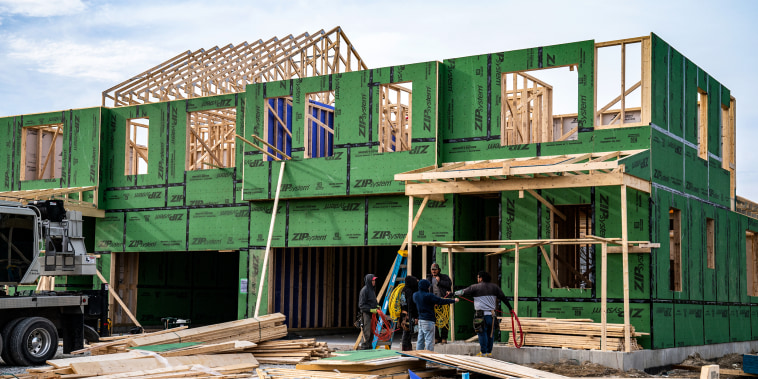The Census Bureau says U.S. companies broke ground on a surprisingly high number of houses in November.
The agency says housing starts rose 9% from a year ago, primarily because of an 18% increase in starts on single-family houses.
Housing starts are measured in rates that are multiplied by 12, with additional adjustments applied, to show how many homes would be built if construction continued at that pace for a full year. At the November clip, companies would have built about 1.1 million single-family homes and 1.56 million homes overall, according to the Census Bureau.
Economists expected a significantly lower rate of 1.36 million total homes, according to a survey conducted by Dow Jones Newswires and The Wall Street Journal.
That could be good news for buyers. Housing demand has been overwhelmingly strong since the Covid-19 pandemic began as more millennials started families, and more people were able to do their jobs remotely.
But supplies have been tight. The pandemic disrupted supply chains and slowed construction. After that, mortgage rates began to spike, which made people reluctant to put older homes on the market.
All of that has contributed to demand for newly-built houses.
At the same time, mortgage have rates started to decline. According to government-backed lender Freddie Mac, the rate on a 30-year fixed rate mortgage fell below 7% last week for the first time since August.
Mortgage rates had hit 20-year highs, peaking at 8% in October, as investors thought interest rates might stay elevated for even longer. Since then, they’ve grown more convinced that rates will start to decrease next year. The Federal Reserve essentially endorsed that view this month.
Lawrence Yun, chief economist for the National Association of Realtors, noted that home sales have risen this year because of incentives from builders and agents. And even with the increase in starts in November, construction would have to increase even further to meet demand.
‘Even more homebuilding will be needed with the housing shortage persisting in most markets,’ Yun wrote. ‘Home price appreciation can only moderate from drastically improved supply. Another 30% rise in home construction can easily be absorbed in the marketplace, especially in light of recent weeks’ plunge in mortgage rates.’
Bill Adams, chief economist for Comerica Bank, said the increase in construction is a good sign for the economy in 2024.
“The pullback in long-term interest rates will help both single-family and multi-family construction grow next year, contributing to overall economic growth and reducing the likelihood of a recession,” Adams wrote in an email.
Investors seem optimistic about demand for home construction as well, as many leading builders are outperforming the broader stock market. Lennar has rallied 67% in the last 12 months while PulteGroup has soared 130% and NVR is up 50%.
The benchmark S&P 500 index is up 25% over that time.
